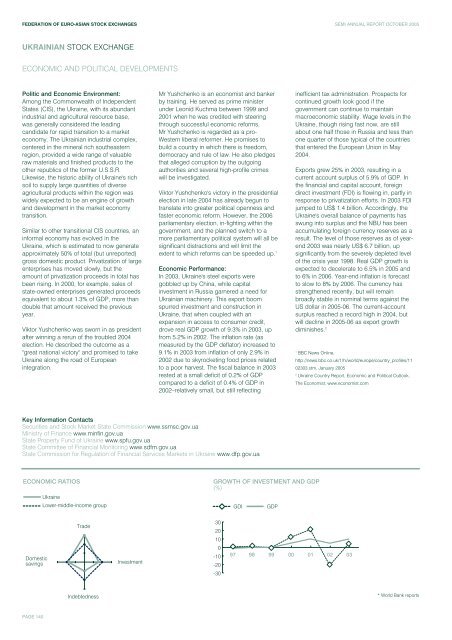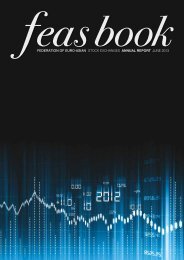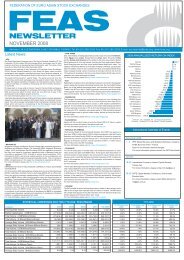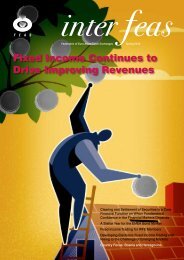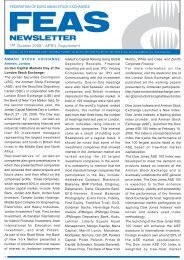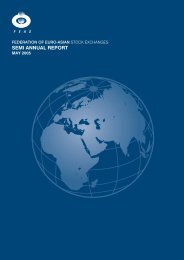Download - FEAS
Download - FEAS
Download - FEAS
Create successful ePaper yourself
Turn your PDF publications into a flip-book with our unique Google optimized e-Paper software.
FEDERATION OF EURO-ASIAN STOCK EXCHANGES SEMI ANNUAL REPORT OCTOBER 2005<br />
UKRAINIAN STOCK EXCHANGE<br />
ECONOMIC AND POLITICAL DEVELOPMENTS<br />
Politic and Economic Environment:<br />
Among the Commonwealth of Independent<br />
States (CIS), the Ukraine, with its abundant<br />
industrial and agricultural resource base,<br />
was generally considered the leading<br />
candidate for rapid transition to a market<br />
economy. The Ukrainian industrial complex,<br />
centered in the mineral rich southeastern<br />
region, provided a wide range of valuable<br />
raw materials and finished products to the<br />
other republics of the former U.S.S.R.<br />
Likewise, the historic ability of Ukraine's rich<br />
soil to supply large quantities of diverse<br />
agricultural products within the region was<br />
widely expected to be an engine of growth<br />
and development in the market economy<br />
transition.<br />
Similar to other transitional CIS countries, an<br />
informal economy has evolved in the<br />
Ukraine, which is estimated to now generate<br />
approximately 50% of total (but unreported)<br />
gross domestic product. Privatization of large<br />
enterprises has moved slowly, but the<br />
amount of privatization proceeds in total has<br />
been rising. In 2000, for example, sales of<br />
state-owned enterprises generated proceeds<br />
equivalent to about 1.3% of GDP, more than<br />
double that amount received the previous<br />
year.<br />
Viktor Yushchenko was sworn in as president<br />
after winning a rerun of the troubled 2004<br />
election. He described the outcome as a<br />
"great national victory" and promised to take<br />
Ukraine along the road of European<br />
integration.<br />
ECONOMIC RATIOS<br />
PAGE 140<br />
Ukraine<br />
Lower-middle-income group<br />
Mr Yushchenko is an economist and banker<br />
by training. He served as prime minister<br />
under Leonid Kuchma between 1999 and<br />
2001 when he was credited with steering<br />
through successful economic reforms.<br />
Mr Yushchenko is regarded as a pro-<br />
Western liberal reformer. He promises to<br />
build a country in which there is freedom,<br />
democracy and rule of law. He also pledges<br />
that alleged corruption by the outgoing<br />
authorities and several high-profile crimes<br />
will be investigated.<br />
Viktor Yushchenko's victory in the presidential<br />
election in late 2004 has already begun to<br />
translate into greater political openness and<br />
faster economic reform. However, the 2006<br />
parliamentary election, in-fighting within the<br />
government, and the planned switch to a<br />
more parliamentary political system will all be<br />
significant distractions and will limit the<br />
extent to which reforms can be speeded up. 1<br />
Economic Performance:<br />
In 2003, Ukraine's steel exports were<br />
gobbled up by China, while capital<br />
investment in Russia garnered a need for<br />
Ukrainian machinery. This export boom<br />
spurred investment and construction in<br />
Ukraine, that when coupled with an<br />
expansion in access to consumer credit,<br />
drove real GDP growth of 9.3% in 2003, up<br />
from 5.2% in 2002. The inflation rate (as<br />
measured by the GDP deflator) increased to<br />
9.1% in 2003 from inflation of only 2.9% in<br />
2002 due to skyrocketing food prices related<br />
to a poor harvest. The fiscal balance in 2003<br />
rested at a small deficit of 0.2% of GDP<br />
compared to a deficit of 0.4% of GDP in<br />
2002–relatively small, but still reflecting<br />
Key Information Contacts<br />
Securities and Stock Market State Commission www.ssmsc.gov.ua<br />
Ministry of Finance www.minfin.gov.ua<br />
State Property Fund of Ukraine www.spfu.gov.ua<br />
State Committee of Financial Monitoring www.sdfm.gov.ua<br />
State Commission for Regulation of Financial Services Markets in Ukraine www.dfp.gov.ua<br />
Domestic<br />
savings<br />
Trade<br />
Indebtedness<br />
Investment<br />
GROWTH OF INVESTMENT AND GDP<br />
(%)<br />
30<br />
20<br />
10<br />
0<br />
-10<br />
-20<br />
-30<br />
97<br />
GDI GDP<br />
inefficient tax administration. Prospects for<br />
continued growth look good if the<br />
government can continue to maintain<br />
macroeconomic stability. Wage levels in the<br />
Ukraine, though rising fast now, are still<br />
about one half those in Russia and less than<br />
one quarter of those typical of the countries<br />
that entered the European Union in May<br />
2004.<br />
Exports grew 25% in 2003, resulting in a<br />
current account surplus of 5.9% of GDP. In<br />
the financial and capital account, foreign<br />
direct investment (FDI) is flowing in, partly in<br />
response to privatization efforts. In 2003 FDI<br />
jumped to US$ 1.4 billion. Accordingly, the<br />
Ukraine's overall balance of payments has<br />
swung into surplus and the NBU has been<br />
accumulating foreign currency reserves as a<br />
result. The level of those reserves as of yearend<br />
2003 was nearly US$ 6.7 billion, up<br />
significantly from the severely depleted level<br />
of the crisis year 1998. Real GDP growth is<br />
expected to decelerate to 6.5% in 2005 and<br />
to 6% in 2006. Year-end inflation is forecast<br />
to slow to 8% by 2006. The currency has<br />
strengthened recently, but will remain<br />
broadly stable in nominal terms against the<br />
US dollar in 2005-06. The current-account<br />
surplus reached a record high in 2004, but<br />
will decline in 2005-06 as export growth<br />
diminishes. 2<br />
1 BBC News Online,<br />
http://news.bbc.co.uk/1/hi/world/europe/country_profiles/11<br />
02303.stm, January 2005<br />
2 Ukraine Country Report, Economic and Political Outlook,<br />
The Economist, www.economist.com<br />
98 99 00 01 02 03<br />
* World Bank reports


